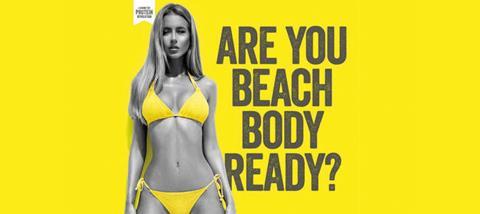Lucinda van der Hart reflects on what we can learn from what may have been 2015’s most hated advert.

Summer is here and, like it or not, bikini season is well and truly upon us. If that thought has you quaking in your flip-flops, stay with me and spare a thought for the thousands of Londoners (myself included) who, back during a wet and windy May, were forced to face the question: ‘Are you beach body ready?’
Said question was thrown at us by a controversial, and subsequently banned, billboard advert for a range of weight loss meal replacement shakes and vitamin capsules sold by Protein World.
The advert appeared one morning, plastered across the wall exactly opposite the spot where I stand and wait for the tube at my local underground station. As I clapped eyes on it I instinctively moved to position myself between the poster and my six year-old daughter’s eye line.
If you haven’t seen the advert, you’ll now be wondering about the offensive nature of the image that triggered this reaction in me. But in many ways it showed nothing we haven’t all seen on hundreds of billboards: a well-toned, perfectly proportioned, Photoshopped, slim white woman in a bikini. Yet this is the advert that led to a flurry of outraged protest. So why the stir?
GOD HAS PROVIDED THE MOST INCREDIBLE HUMAN VESSEL THROUGH WHICH TO ENJOY HIM AND HIS CREATION
Alongside the image, the advert featured bold black capitals, yelling: ‘Are you beach body ready?’ Maybe it was this aggressive question that riled so many. Or was it the dominant, confrontational stance the model was told to adopt? Or her penetrating glare? Maybe the reaction was simply evidence of a new zeitgeist that says: ‘We’ve had this pressure put on us one time too many. Enough is enough.’
The backlash
Some of the ads were defaced, with feminist bloggers going to tube stations and photographing themselves in their own bikinis as they stood next to the advert. Plus-size retailers, as well as Dove, with its Campaign for Real Beauty, spotted a clever retaliatory marketing opportunity. Fashion outlet simplybe.co.uk and online swimwear retailer swimsuitsforall.com rapidly made their own versions. The latter featured plus-size model Ashley Graham in a black bikini. The ad was emblazoned with the words: ‘Are you ready for this beach body?’
More than 71,000 people signed a petition against the original advert and a protest was held in Hyde Park. Then there was the social media reaction, and this is where things really hotted up. One woman tweeted Protein World to tell them she had signed the petition against the advert because throughout her life she had believed ‘I’m not good enough’. The company’s tweeted response was: ‘We are a nation of sympathisers for fatties.’ Another tweet read: ‘Why make your insecurities our problem?’
Eating humble pie (of the low-fat variety, obviously) might have been the expected response from the brand at this stage. But no. Instead, it went on the offensive, even sarcastically telling one member of the Twitterati: ‘Here is a shoulder for you to cry on.’ The callous responses were either an extraordinary instance of foot-in-mouth marketing, or a highly intelligent advertising ruse. Protein World claims that its sales went through the roof during the campaign.
A refusal to shame women into action
Whatever Protein World’s motive was, I am encouraged by the defiant public response to an advert that works on the premise of shaming women into a guilt-laden, fear-fuelled product purchase. It’s a cultural nudge in the direction of an understanding of beauty that goes more than skin deep, recognising the part that confidence, character and choices play in the outward image we project.
In her latest book, Beloved (IVP), which tackles body image and beauty issues head on, Rachel Gardner writes: ‘There’s something liberating about revolting against the mainstream! It’s what Esther did. It’s what made her story ageless. There have been other beautiful women whose names have gone down in history: Cleopatra, Helen of Troy, Marie Antoinette, Marilyn Monroe, the list goes on. But none of these women demonstrated the great truth that the most beautiful you will ever be is when you dare to lose everything for the sake of others…I passionately believe the most beautiful you will ever be is when you love others. When you lay down your rights, status and dreams for the sake of the lost, the last and the least.’
The healthies versus the fatties
The Protein World fiasco highlighted once again that the tendency in discussions around body image is to pit two polarised groups against each other. And more ammo for the war between the ‘healthies’ and the ‘fatties’ is not something we need. Interestingly, Stylist magazine’s piece on the advert firmly informed readers which camp the title aligns itself with, stating that its office is ‘strictly a diet-free zone’.
The Protein World advert has been banned by the Advertising Standards Authority, which has also launched an investigation to determine whether it ‘breaks harm and offence rules or is socially irresponsible’. I am delighted, of course. But our response needs to be more considered than simply stepping into the reactionary: ‘I’m fat and proud of it’ camp. Why? Because as Jesus followers we are called to define ourselves in and through Christ, not by our looks or bodies: fat, thin, healthy, sick, unhealed or anywhere in between.
Team trash-the-body
The inclination to forcefully align oneself with one side of the body image debate strikes me as reflecting two broad views on the body that have often prevailed within the Church.
Team ‘spiritual before physical’, aka team trash-the-body, can sometimes be identified by its desire for that extra chocolate éclair, washed down with the cream-topped hot chocolate. Oh, and the two burgers, fries and mega-size soft drink on the side. Why not? Jesus loves me, and I’m going to heaven. I will eat, drink and be merry, thank you very much.
Statistics released in January this year by Baylor University in the US indicated that more than one third of American clergy are obese; a figure that correlates with American national statistics. Worldwide, obesity has more than doubled since 1980, with 39% of adults deemed overweight in 2014, according to the World Health Organization.
Before we get too critical, let’s remember that obesity can of course be triggered by physical or psychological illness, and those facing this life hurdle need help and support. But if we put inescapable causes to one side for a moment, my sense is that the sort of outlook I parody above may not be uncommon among committed Christians and church leaders in the US. And I’d like to postulate that many UK Christians often, perhaps even without realising, also slip into this thinking (and, in some cases, theological justification for unhealthy living).
AS JESUS FOLLOWERS WE ARE CALLED TO DEFINE OURSELVES IN AND THROUGH CHRIST, NOT BY OUR LOOKS OR BODIES
Travel back into the depths of Church history, and of course this sort of ‘decry the physical’ outlook is nothing new. The Gnostics regarded the body as evil (as did Augustine, arguably, although his physical hatred tended to relate more to his own inability to control sexual appetite). Christ, said the Gnostics, could not possibly have been fully human when he came into this broken world. How could God ever have lowered himself to enter such a flawed container as the physical human body?
Team worship-the-body
During my lifetime, there has been something of a mounting Christian counter-reaction to the team trash-its. Team worship-the-body runs before breakfast and fits in at least 15 sessions of Pilates, Body Pump and Boxercise a week. Its members know every detail about the latest diet craze and mostly live on spirulina powder (what is that?), fermented vegetables and dandelion greens (hailed as the superfoods of 2015, didn’t you know?) This approach is rooted in Paul’s teaching: ‘Your body is a temple’ (see 1 Corinthians 6:19-20), as well being formed in reaction to the skewed theology outlined above. But allowed to run to its full life-consuming conclusion, it aligns itself with the idealistic, perfection-seeking body worship for which Protein World has been so heavily critiqued. It also rubs up against serious ideological problems when it comes to that thing none of us can escape: ageing. And what happens when you develop an injury or illness that can’t, or apparently won’t, be healed?
A middle way
Tara M Owens’ Embracing the Body (IVP) directs us towards a middle way. Without the physical body, she reminds us, neither you nor I would be able to encounter or even conceive of the divine. God has provided the most incredible human vessel through which to enjoy him and his creation.
‘God’s action in Christ insists that each person matters, and matters deeply, and that mattering has as much to do with our bodies as it does with our souls,’ Owens writes. ‘Why would our bodies matter? Why would my flabby arms or bony knees or acne-prone skin matter to the creator of the universe? Our bodies matter because without them we aren’t human…Christianity insists on our individuality and the redemption of each of us.’
GOD SEEKS TO RESTORE US – MIND, SOUL AND BODY – INTO AN INTEGRATED WHOLE
Isaiah 61:1 introduces us to a Christ who came to ‘bind up the broken-hearted’. The Hebrew word used here for heart is leb, which refers to our innermost selves, our core, our will. The leb shebar – or broken-heartedness – that God comes to heal is likened by Owens to the restoration of pottery that has been shattered on the ground. Instead of applying a plaster across the wound, God seeks to restore us – mind, soul and body – into an integrated whole. Restoration and redemption come not only in eternity, but in and through our imperfect physical bodies, in the earthly here and now.
Joseph Gisbey, author of Follow: Walking in the Dust of the Rabbi (Darton, Longman and Todd) who formerly struggled with an eating disorder, writes: ‘In reality a healthy “self image”, only really comes when we lose our “self” in God. Paul talks often about the fact that we have died and the life we live we now live because of Christ in us. This is where priorities change. We are no longer our own.’
So if we are broken – shattered, even – then we are ready. Not merely for floating about on a beach somewhere, but ready to embody the love and grace of God despite our many imperfections. As one Protein World poster defacer scrawled in large black pen on the advert: ‘If my body is on a beach, then it is ready. Thank you very much.’
A new beauty manifesto
Rachel Gardner shares her own beauty manifesto in Beloved (IVP)
1. I am human being shaped, not magazine shaped. So I will start with accepting the body I have, not the body I think I should have.
2. I am perfectly imperfect. So I won’t despair when I get spots, wrinkles or bloated... The people who truly love me, love the whole lot. Genuinely! Instead of obsessing with the things I’d like to tweak or do over, I’ll focus on my inner life and how beautiful that is becoming.
3. I’ll dress to express, not to impress. So what I wear has to fit my shape, not just my body shape, but the person God is helping me to become.
4. My body is my companion, not my project. So keeping my body reasonably healthy and clean is being a good steward of God’s gift.
5. I will appreciate my body for what it does, not just for what it looks like. I am called to serve the will of God. This involves my body; comforting people, going places, sitting with someone trapped in hopelessness. It’s not the size of my boobs or the whiteness of my smile that has the greatest impact on hurting lives.
6. I will chase beauty, not glamour. So I’ll limit the amount of air-time I give fashion magazines and shopping trips because I know that un-checked these can rob me of valuing a beautiful heart over a perfect face. I want Jesus to open my eyes to true beauty that comes from surrendering myself to him.
7. I will live from the inside out, focusing on God first. So I’m signed up for God’s plan for my life and won’t opt out of doing what he asks because I am self-absorbed about how I look, or held back by my fears and insecurities.
8. I will be realistic and positive about myself. So I’ll allow people I trust to help me embrace the real me and challenge the times I act or dress in ways that don’t fit with who I am.
The male reaction
Premier Youthwork’s Jamie Cutteridge shares his thoughts on the Protein World advert
Being a man is so much easier than being a woman. This isn’t a weird, humble brag, but a by-product of millennia of patriarchy that we’re still living in the wake of. We are not bombarded with images of slimline men in the same way women are (often for us, problems involve lust rather than self-image).
This is not to say that men aren’t affected by body image issues, but there’s definitely a masculine streak that is willing to turn our weight into a bit of a joke, even if some of us do struggle and are dying inside as we cover it up with humour. The encouraging thing about the reaction to the beach body ready advert was the number of men standing up against it and calling it out for the damage it could cause.
There are, of course, times that the male body is exploited, but we’ve also grown up in a culture in which there is infinitely less pressure on how men look. As men and, in reality, still the section of society holding a disproportionate amount of power and influence, we should express to men and women alike that they are loved by God irrespective of looks. We need to stand up against a culture that objectifies anyone; we are all temples of the Holy Spirit.




































